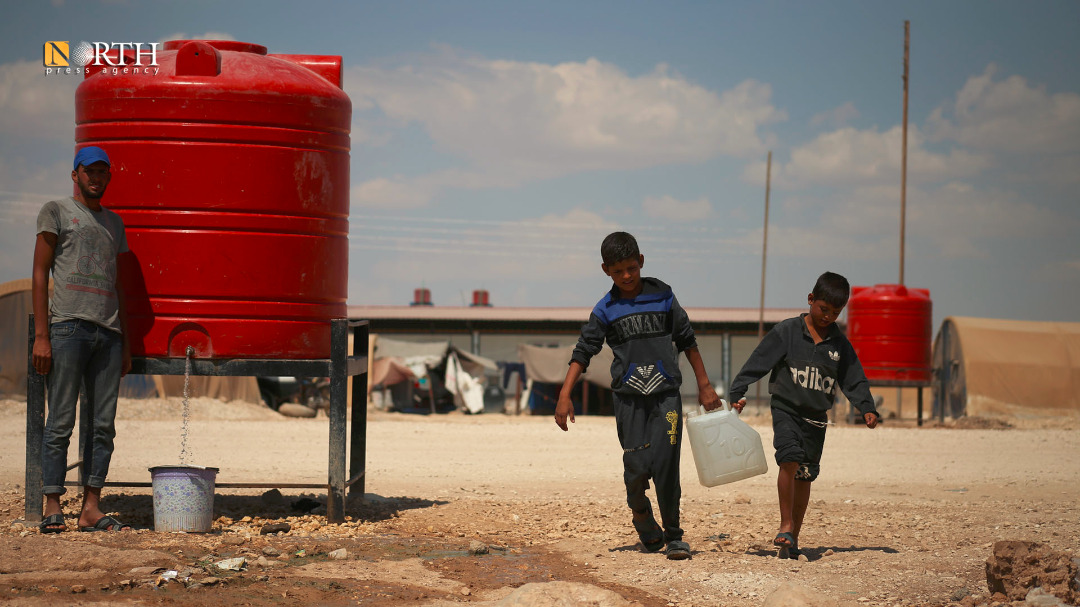
QAMISHLI, Syria (North Press) – On Sunday, a spokesman for the Autonomous Administration criticized the lack of invitation to an international meeting on Syria, because their forces are still fighting terrorism and the region needs reconstruction, while an official in the camps said he hoped decisions would lead to the reopening of Tel Kocher (Yaroubiyah) humanitarian crossing.
Today, an international meeting, chaired by the United States of America, is being held to discuss the Syrian issue, in the Italian capital, Rome.
According to information circulated about the meeting, members of the mini-group, which includes America, Britain, France, Germany, Saudi Arabia, Jordan and Egypt, and the foreign ministers of the Big Seven, in addition to Turkey, Qatar and the UN envoy, Geir Pedersen, will attend.
Absent representation
Loqman Ahmi, an official spokesman for the Autonomous Administration, “We expected an invitation to the G7 Rome meeting for the Department of Foreign Relations in North and East Syria.”
“Since the Autonomous Administration in North and East Syria (AANES) and the Syrian Democratic Forces (SDF) fought on the ground and defeated ISIS more three years ago, those who fight strongly must participate in the political sessions, because the outcomes of this meeting must be implemented in northeast Syria,” Ahmi added.
Shortly before the conference, US Secretary of State Antony Blinken invited the Arab League to participate in order to raise the issue of normalization between Damascus and Arab countries, according to what was reported by the media.
The meeting will be held on the sidelines of the conference of foreign ministers of the countries of the Global Coalition to combat the Islamic State (ISIS), to discuss the efforts made in the campaign to achieve the final defeat of ISIS.
In a statement, the US State Department said that the ministers will discuss ways to maintain pressure on ISIS remnants in Syria and Iraq, and to confront its networks in other places such as Africa.
On March 23, 2019, SDF Commander-in-Chief Mazloum Abdi, announced the control of the last pockets of ISIS in eastern Syria, with the support of the Global Coalition.
But the sleeper cells of ISIS are still active in various areas of north and east Syria, and Deir ez-Zor in particular.
On Sunday, the SDF said in a statement that after their success in the first phase of fighting ISIS, “we still have a lot of work ahead in the second phase to eliminate the structure of the terrorist organization and its extremist ideology and confront its terrorist messages.”
“Our forces and local communities are looking forward that the Global Coalition will continue its commitment to support development assistance to stabilize stability, enhance security, and protect northern and eastern Syria and its communities from the threat of the terrorist organization.”
The spokesperson for the Autonomous Administration, from his office in Qamishli, said that the infrastructure of northern and eastern Syria was destroyed in a major war against ISIS, and therefore it must be supported.
During his speech, he identified these demands for support in economic and humanitarian issues.
Humanitarian support
On previous occasions, the Autonomous Administration repeated its demands to reopen the Yaroubiyah crossing, which was closed about a year ago by a decision of the UN Security Council, after Russia and China, two main allies of the Damascus government, used their veto.
Both Russia and China said that the entry of aid into Syrian territory requires the approval of the legitimate government, in reference to the Damascus government, headed by Bashar al-Assad, despite protests against his rule ten years ago.
The closure of the Yaroubiyah crossing coincided with the spread of the Coronavirus in the areas of northeastern Syria, although it is the only outlet for international relief organizations and non-governmental organizations to bring aid into the area.
In its held areas the AANES operates 15 camps, including Hawl camp, which houses about ten thousand women and children of ISIS members, and other displaced people are spread in its areas in shelters and random camps.
Sheikhmous Ahmed, head of the Office of Displaced Persons and Refugees in the Autonomous Administration of AANES, said that the new US administration headed by Joe Biden might want to correct the mistakes that were practiced against Syrian refugees in the Autonomous Administration’s areas, during the era of former President Donald Trump’s rule.
The new US administration focuses on the need to open humanitarian corridors to secure the entry of aid into Syria.
The title “Providing and Expanding the UN Cross-Border Aid Mechanism” tops the agenda of the international meeting chaired by Washington.
The official in charge of the camps in northeastern Syria also hopes that the countries present at the meeting will pressure Turkey to re-pump the waters of Alouk Station, towards the city of Hasakah, which feeds about one million people.
Alouk station is considered the main source of drinking water for the cities of Tel Tamr, Hasakah, Shaddadi, Hawl, its countryside and its affiliated camps.
Since the Turkish forces and their affiliated armed groups occupation of the city of Sere Kaniye area in October of 2019, it stopped operating the station 17 times until January of this year.
Regarding the crossings, Ahmed expected that the meeting would come up with decisions to pressure the Security Council to reopen humanitarian corridors, including the Yaroubiyah crossing.
